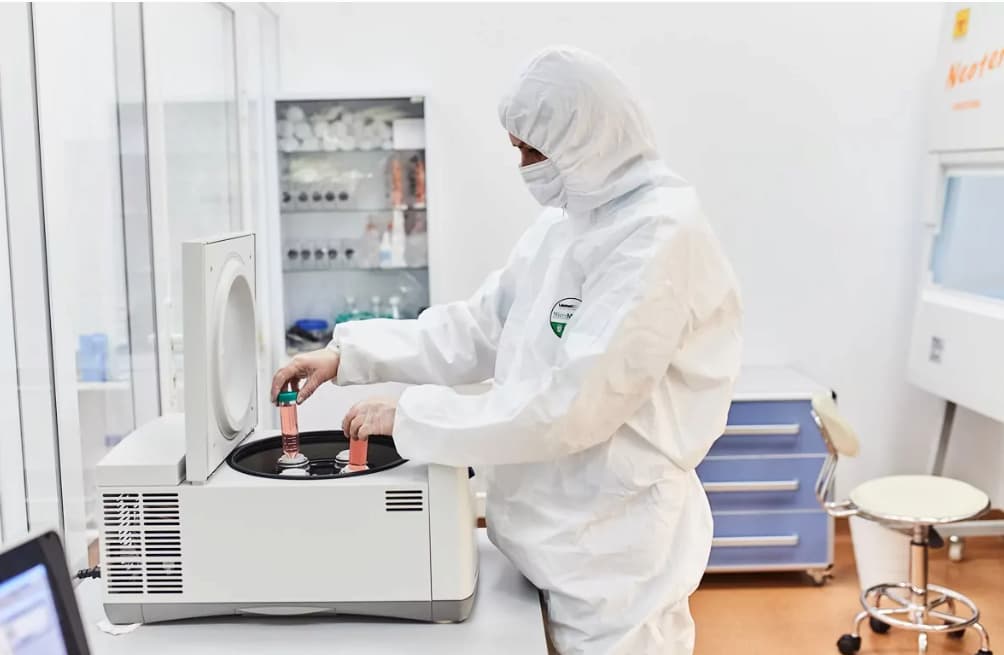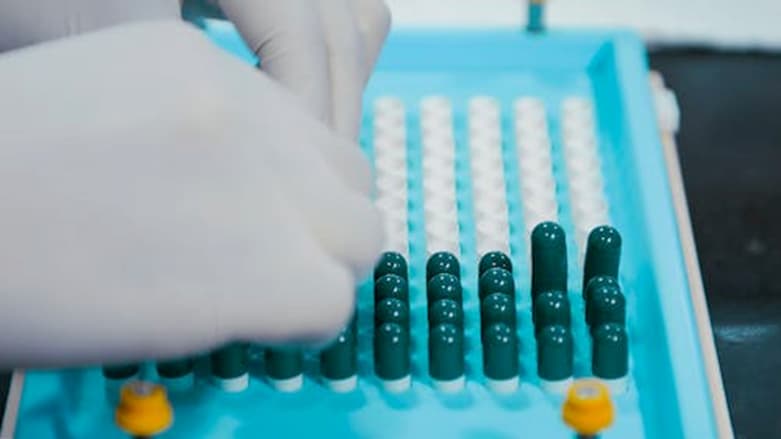Mesenchymal stem cells (MSCs) have become a prominent subject of modern research due to their wide clinical applications and immense therapeutic potential. These are the cells from which a number of other specialized cells of different organs are generated through differentiation and self-renewal.
This article discusses the origin, types, and regenerative potential of MSCs, as well as the benefits and risks associated with this therapy. We will first cover a variety of stem cell types to understand where they can originate from, and then look at the types Swiss Medica uses.
Types of Stem Cells
These cells are classified into five groups based on their differentiation potential, as explained below:
Totipotent Cells
These cells are considered the most powerful kind of cells as they have the ability to differentiate into embryonic as well as extra-embryonic tissues, including the yolk sac, amnion, chorion, and allantois. In humans, these tissues form the placenta.
The most important characteristic of totipotent cells, also called omnipotent cells, is that they can generate a fully functional, living organism.
Pluripotent Cells
These cells can self-renew and differentiate into ectoderm, endoderm, or mesoderm. These are three germ layers, which later differentiate further to form all tissues and organs of our body.
Embryonic cells are the best example of pluripotent cells. These are unique cells existing in an early-stage embryo.
Multipotent Cells
Multipotent cells can self-renew and differentiate into a specific range of cell types. Mesenchymal Stromal Cell is an excellent example of this cell type, which is widely used in the treatment of several disorders, such as diabetes, bone fracture, spinal cord injury, and autoimmune diseases.
Oligopotent Cells
Oligopotent cells are similar to multipotent cells, although they are further restricted in their ability to differentiate. They can differentiate to a limited extent and only into closely related cell types.
The hematopoietic stem cell (HSC) is an excellent example of this cell type.
Unipotent Cells
These are the most limited and least potent types of cells. Muscle stem cells are an example of this cell type.
Although these cells have the ability to self-renew and differentiate, they can do so only in a single cell type. Moreover, they are unidirectional in their capacity to differentiate.
Get a free online consultation
Please, contact our medical advisor to discuss your health condition with a specialist in regenerative medicine. You can also leave your contact details for a callback. It is free and confidential.

MD, Endocrinologist, Pediatrician, regenerative medicine specialist, R&D director
What are Mesenchymal Stem Cells?
MSCs are multipotent cells, which means they have the ability to differentiate and generate a variety of cell types. For example, they can generate:
- Bone cells (osteoblasts)
- Fat cells or adipose tissue (adipocytes)
- Cartilage cells (chondrocytes)
- Muscle cells (myocytes)
- Heart muscle cells (cardiomyocytes)
- Hepatocytes, neurons and pancreatic islet cells

Morphologically, MSCs are thin, long cells with a large nucleus, like most other cells in the body.
However, the self-renewal and regenerative potential of these cells and their ability to maintain multipotency provide them with enormous therapeutic potential for tissue repair.
Their capability to differentiate into specific cell types, like adipocytes, chondrocytes, cardiomyocytes, and osteocytes, can support the healing of tissues damaged due to aging, inflammation, oxidative stress, toxic damage, radiation, and other factors.
Where are Mesenchymal Stem Cells Found?
Some sources of human mesenchymal cells include:
- Placenta
- Amniotic fluid
- Umbilical cord
- Umbilical cord blood
- Bone marrow
- Adipose tissue
- Periosteum
In addition, MSCs can also be isolated from the fallopian tube and peripheral blood. MSCs are also found in dental pulp, periodontal ligament, tendon, skin, muscle, and other tissues.
What Characteristics Define Human MSCs?
MSCs are defined by their characteristic ability for self-renewal and differentiation into specific cell types such as osteogenic, chondrogenic, adipogenic, and other lineages. In addition, MSCs show strong immunomodulation potential and low immunogenicity, making them effective therapies for the management of autoimmune disorders and organ transplantation.
Advantages and Disadvantages of MSCs
Mesenchymal stem cells for regenerative medicine offer several advantages, such as:
- Ability to self-regenerate and differentiate into several cell lineages
- Immunomodulatory properties
- Easier availability in several tissues
- Ease of isolation and culture
- Lack of ethical issues resulting from their use
Although MSCs offer several advantages, there are some concerns associated with their therapeutic efficacy.

For example, there are differences in the isolation efficiency of MSCs among people of different ages. Studies have revealed that cells from elderly donors are usually more vulnerable to oxidative damage. They also have a lower proliferation rate.
What is the Function of MSCs?
Mesenchymal stem cells (MSCs) play a crucial role in tissue repair and regeneration. While their primary function involves self-renewal and division to maintain their population, MSCs also exhibit remarkable abilities to differentiate into specialized cell types.
Another important function of MSCs is their capacity to modulate the immune response. They can exert immunomodulatory effects by interacting with immune cells, such as T cells, B cells, and macrophages, helping to regulate inflammation and promote tissue healing. Additionally, MSCs secrete various bioactive molecules, including growth factors, cytokines, and extracellular vesicles, which contribute to tissue repair and regeneration processes.
When administered to sites of injury or disease, MSCs can integrate into damaged tissues, promote angiogenesis (the formation of new blood vessels), and facilitate tissue repair through their differentiation abilities and paracrine signaling.
Differentiation Potential of MSCs
Mesenchymal stem cells (MSCs) possess the ability to undergo differentiation into various cell types with distinct functions. This inherent versatility is crucial for their therapeutic potential.
Their ability to differentiate into diverse cell types underscores their significance in regenerative medicine and tissue engineering. By harnessing the differentiation potential of MSCs, researchers aim to develop innovative therapies for various conditions, ranging from bone defects to neurological disorders.
Mesenchymal Stem Cells in Treating Diseases
Mesenchymal stem cells (MSCs) stand out in medical research due to their unique properties and potential therapeutic benefits. Here’s how MSCs are utilized in treating diseases:
- Differentiation Potential: unlike pluripotent stem cells, MSCs are partially differentiated, making them easier to manage and direct towards specific cell types needed for therapy. They can be harvested from a person’s own tissues, reducing the risk of immune rejection commonly associated with other types of stem cells.
- Ethical Considerations: MSCs offer an ethical advantage as they don’t require fetal tissues or aborted embryos for therapy, thereby avoiding ethical controversies surrounding stem cell research.
- Trophic Properties: MSCs possess trophic properties, meaning they produce growth factors and chemokines that stimulate cell proliferation and angiogenesis (the formation of new blood vessels). This promotes tissue repair and regeneration in damaged areas.
- Anti-inflammatory and Immunomodulatory Effects: MSCs have anti-inflammatory properties, producing various proteins and growth factors that modulate the immune response. They can respond to inflammatory molecules and regulate interactions between different immune cells, potentially offering benefits in autoimmune diseases and inflammatory conditions.
- Anti-apoptotic Properties: MSCs exhibit anti-apoptotic effects, meaning they can prevent cell death. While the mechanisms are not fully understood, MSCs have been shown to upregulate the production of certain proteins associated with cell survival.
In summary, MSCs hold promise as a versatile tool in regenerative medicine and disease treatment. Their ability to differentiate into various cell types, along with their trophic, anti-inflammatory, and anti-apoptotic properties, makes them valuable candidates for therapeutic interventions across a wide range of medical conditions.
What Medical Conditions Can MSCs Be Used For?
Clinical trials of mesenchymal stem cells have revealed that MSCs can be used to treat a number of medical conditions arising as a result of aging, cancerous changes, inflammation, oxidative stress, and immunological dysfunction.
Some common conditions that can be treated using MSCs include:
- Diabetes mellitus
- Osteoarthritis
- Cancer
- Autoimmune diseases
- Ischemic diseases
- Neurodegenerative disorders
- Organ transplantation
How Do MSCs Contribute to Tissue Repair and Regeneration?
Stem cell therapies form a growing new specialty, commonly referred to as regenerative medicine, aimed at supporting the body’s ability to repair or replace dead or damaged parts.
Though mesenchymal stem cell therapy is nowadays widely used in the management of several diseases, its efficacy cannot be predicted or guaranteed without a preliminary medical examination of patients. It is also important to remember that each case is unique. Hence, mesenchymal stem cell cost and effectiveness depend on several factors, including the patient’s age, stage of the disease, genetics, and lifestyle.
You can consult experienced doctors at Swiss Medica for further information about stem cell therapy and whether it is appropriate for your case.
Contact us
Get a free online consultation to learn about the expected results of stem cell therapy for your case, what is the cost of the treatment, and its duration.

MD, Endocrinologist, Pediatrician, regenerative medicine specialist, R&D director
List of References
https://pubmed.ncbi.nlm.nih.gov/21396235/
Mesenchymal stem cells
Dah-Ching Ding, Woei-Cherng Shyu, Shinn-Zong Li
https://pubmed.ncbi.nlm.nih.gov/35502477/
Research Progress of Totipotent Stem Cells
Jianfeng Cai, Huifang Chen, Shiting Xie, Zhichao Hu, Yinshan Bai
https://pubmed.ncbi.nlm.nih.gov/28188938/
Multipotent Stem Cell and Current Application
Aligholi Sobhani, Neda Khanlarkhani, Maryam Baazm, Farzaneh Mohammadzadeh, Atefeh Najafi, Shayesteh Mehdinejadiani, Fereydoon Sargolzaei Aval
https://www.ncbi.nlm.nih.gov/pmc/articles/PMC3927011/
Role of mesenchymal stem cells in cell life and their signaling
Shihori Tanabe
https://pubmed.ncbi.nlm.nih.gov/24158496/
Natural history of mesenchymal stem cells, from vessel walls to culture vessels
Iain R Murray, Christopher C West, Winters R Hardy, Aaron W James, Tea Soon Park, Alan Nguyen, Tulyapruek Tawonsawatruk, Lorenza Lazzari, Chia Soo, Bruno Péault
https://www.ncbi.nlm.nih.gov/pmc/articles/PMC6431372/
Mesenchymal Stem Cells: Characteristics, Function, and Application
Zhongjun Li, Xingbin Hu, and Jiang F. Zhong
https://pubmed.ncbi.nlm.nih.gov/19513108/
Aging and replicative senescence have related effects on human stem and progenitor cells
Wolfgang Wagner, Simone Bork, Patrick Horn, Damir Krunic, Thomas Walenda, Anke Diehlmann, Vladimir Benes, Jonathon Blake, Franz-Xaver Huber, Volker Eckstein, Petra Boukamp, Anthony D Ho
https://www.ncbi.nlm.nih.gov/pmc/articles/PMC6719501/
The Pros and Cons of Mesenchymal Stem Cell-Based Therapies
Aleksandra Musiał-Wysocka, Marta Kot, and Marcin Majka
https://www.frontiersin.org/articles/10.3389/fbioe.2020.00043
Therapeutic Potential of Mesenchymal Stem Cells for Cancer Therapy
Abdelkrim Hmadcha, Alejandro Martin-Montalvo, Benoit R. Gauthier, Bernat Soria, Vivian Capilla-Gonzalez
https://www.ncbi.nlm.nih.gov/pmc/articles/PMC4413017/
Human mesenchymal stem cells – current trends and future prospective
Imran Ullah, Raghavendra Baregundi Subbarao, and Gyu Jin Rho
https://www.ncbi.nlm.nih.gov/pmc/articles/PMC8284686/
Mesenchymal stem cells: ideal seeds for treating diseases
Guanwen Gao, Chenyang Fan, Weiquan Li, Runzhang Liang, Chuzhong Wei, Xiaojie Chen, Yue Yang, Yueyuan Zhong, Yingqi Shao, Yi Kong, Zesong Li, and Xiao Zhu
MD, Physician in General Medicine, Gastroenterology, Rheumatology, Pulmonology, Cardiology. Regenerative specialist






